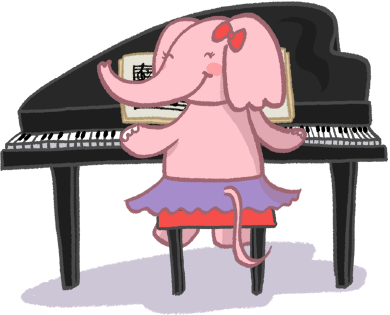In WunderKeys Piano for Preschoolers books (1, 2, and 3) students are introduced to a loveable bunch of animal friends: Thumbelina, Pointer Panda, Middleton Mouse, Ringo Raccoon, and Pinky Pig. These characters appear in the story-based portions of the books, but they also represent a finger on your students’ hands.
Why don’t we just use finger numbers?
WunderKeys preschool books were designed to be a resource that was *truly* created for preschoolers (not a simplified version of a primer). We did this because the brain of a preschooler is very different than that of a child who is age 6+. Between the ages of 3-5, numeracy is a skill that is still developing. There are 4 different stages of numeracy development: emergent, perceptual, figurative, counting on and facile
Most preschoolers are in the emergent phase of numeracy development. This means that skills that their older peers have developed (counting, number words, one-to-one correspondence, understanding numerical sequences, etc.) are not yet solidified. Because of this, asking a preschool-age child to label their pointer finger “2” when they a) haven’t learned to connect the word “two” to the symbol “2” and b) haven’t learned the concept of “counting on” is a request that is beyond their capabilities.
Add to that, “Place your 2 finger on a group of 2 black keys and hold the key for 2 beats”… and you’ve lost them! There are simply too many different skills being asked of them that they haven’t yet developed. Can some preschoolers do this? Absolutely. But are they simply mimicking and coping? Usually. We wanted to develop a solid grounding based on *true* understanding in an age-appropriate way.
WunderKeys helps your preschoolers to develop numeracy skills (we include number recognition activities, counting activities, one-to-one correspondence practice, number tracing, and patterning in the books) but while these skills are developing, preschoolers are still able to reap the brain benefits that are so valuable during these early years.

Enter the Wunderbies!
These characters give your preschoolers the ability to begin to learn to see their fingers as independent entities and to build coordination and strength by using them independently. They also capture your students’ imaginations, enable preschoolers to begin to read early musical notation, and they inspire an atmosphere of “play” at the piano.
Preschoolers develop the ability to connect symbols to sound using images of these characters and the corresponding fingers. The fingers are named in a way that makes it easy for your students to remember each one. Cute finger puppets or printable finger rings are available to further this connection in early lessons.
As your preschoolers develop numeracy skills throughout the program (and naturally at home), they then begin to understand how to identify groups of 2 and 3 black keys on the piano, then rhythmic values, and then finger numbers are used once they graduate the preschool program and move into WunderKeys Primer 1, having already built strong keyboard and rhythmic awareness. By this time, their coordination, finger strength, understanding of numbers, ability to count on, one-to-one correspondence, sound-to-symbol connection, and patterning recognition are ready for finger numbers.
Why not just wait?
Previously, many teachers would suggest students wait to begin piano lessons until they were age 7 (and when numeracy skills were such that finger numbers were understood). However, growing research suggests that the most brain benefits gleaned from piano instruction are experienced before the age of 6 or 7.
“When comparing a motor skill between the two groups, musicians who began before age seven showed more accurate timing, even after two days of practice. When comparing brain structure, musicians who started early showed enhanced white matter in the corpus callosum, a bundle of nerve fibers that connects the left and right motor regions of the brain. Importantly, the researchers found that the younger a musician started, the greater the connectivity.
Interestingly, the brain scans showed no difference between the non-musicians and the musicians who began their training later in life; this suggests that the brain developments under consideration happen early or not at all. Because the study tested musicians on a non-musical motor skill task, it also suggests that the benefits of early music training extend beyond the ability to play an instrument.
This study is significant in showing that training is more effective at early ages because certain aspects of brain anatomy are more sensitive to changes at those time points,” says co-author, Dr. Zatorre, who is also the co-director of the International Laboratory for Brain Music and Sound Research.“
https://www.sciencedaily.com/rel…/2013/02/130212112017.htm
Starting early allows students to take advantage of this “brain-building time” AND provides a joy-filled start to the piano where students gain skills that assist them greatly as they begin Kindergarten. And… the Wunderbies allow all of this to happen in an age-appropriate, skill-building way!

